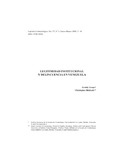| dc.rights.license | http://creativecommons.org/licenses/by-nc-sa/3.0/ve/ | |
| dc.contributor.author | Crespo, Freddy | |
| dc.contributor.author | Birkbeck, Christopher Howard | |
| dc.date.accessioned | 2016-05-11T20:37:42Z | |
| dc.date.available | 2016-05-11T20:37:42Z | |
| dc.date.issued | 2016-05-11T20:37:42Z | |
| dc.identifier.uri | http://www.saber.ula.ve/handle/123456789/41883 | |
| dc.description.abstract | En Venezuela, las tasas delictivas experimentaron un considerable aumento a finales de la década de los setenta y principios de los ochenta. Paralelamente, las instituciones del país tuvieron serias fluctuaciones en su desenvolvimiento, fluctuaciones que fueron desde el crecimiento constante hasta su entrada en crisis y gradual pérdida de legitimidad. Con el propósito de evaluar si existe relación temporal entre estas dos situaciones, parte la presente investigación, en donde se maneja como hipótesis que la variación de la legitimidad de las principales instituciones del país guarda asociación con el aumento de las tasas delictivas, tomando como base el modelo teórico de “deslegitimización institucional” propuesto por Gary LaFree. Se examinó, en primer lugar, la legitimidad institucional en el país y, en segundo lugar, la tendencia de cinco tasas delictivas, todo esto en un período de 45 años. Estas dos variables, a pesar de asociarse de manera significativa con el empleo del coeficiente de correlación de Pearson, no reflejaron asociación significativa cuando se les aplicó un método estadístico adecuado para series temporales, salvo la excepción del robo que se asoció con ciertas variables económicas y sociales, pero no siempre en la dirección esperada según el modelo de LaFree. | es_VE |
| dc.rights | info:eu-repo/semantics/openAccess | |
| dc.subject | Legitimidad | es_VE |
| dc.subject | Instituciones sociales | es_VE |
| dc.subject | Delincuencia | es_VE |
| dc.title | Legitimidad institucional y delincuencia en Venezuela. | es_VE |
| dc.title.alternative | Institutional legitimacy and delinquency in Venezuela. | es_VE |
| dc.type | info:eu-repo/semantics/article | |
| dc.description.abstract1 | In Venezuela, delinquency rates increased considerably between the end of the seventies and the beginning of the eighties. Parallel to this growth, the national institutions experienced serious fluctuationsin in their development, from constant growth to their entering into crisis and gradually losing legitimacy. The present research aims at evaluating the possibilty of a temporal relationship between these two situations positing the hypothesis that the variation of the legitimacy of the main institutions of the country is associated with the increase of the delinquency rates, taking Gary LaFree’s theoretical model of “institutional delegitimation”. Firstly, the institutional legitimacy in the country was examined and secondly, the tendency of five delinquency rates, both for a period of 45 years. In spite of being significantly related by means of Pearson’s correlation coefficient, they did not reflect this when a statistical method adequate to temporal series was applied, with the exception of theft, derived from certain economic and social variables, but not always in the expected direction according to LaFree’s model. | es_VE |
| dc.description.email | frecrepe@ula.ve | es_VE |
| dc.description.email | birkbeck@ula.ve | es_VE |
| dc.publisher.pais | Venezuela | es_VE |
| dc.subject.institucion | Universidad de Los Andes (ULA) | es_VE |
| dc.subject.keywords | Legitimacy | es_VE |
| dc.subject.keywords | Social institutions | es_VE |
| dc.subject.keywords | Delinquency | es_VE |
| dc.subject.tipo | Artículos | es_VE |
| dc.type.media | Texto | es_VE |


